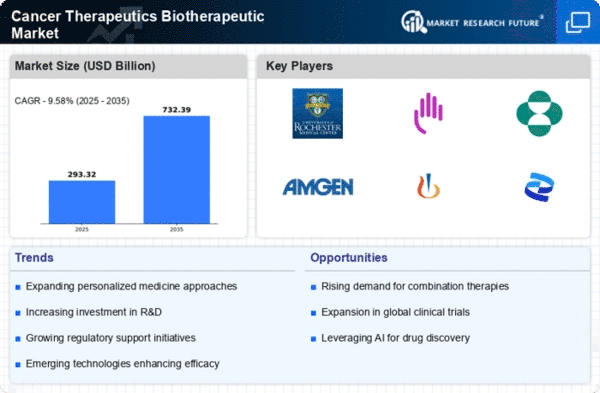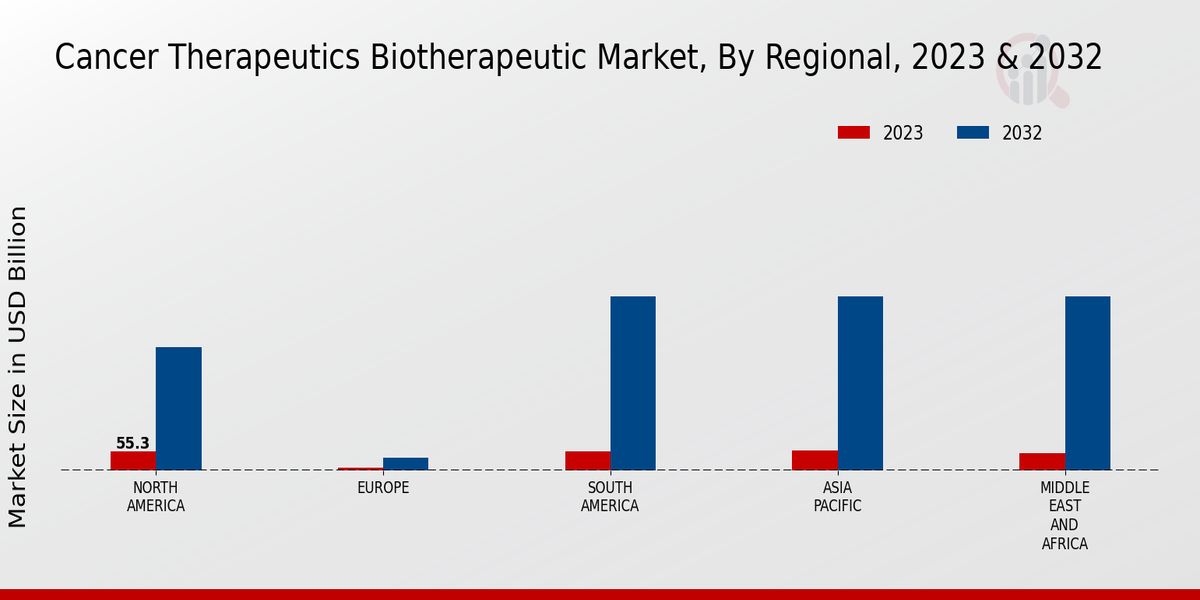Market Growth Projections
The Global Cancer Therapeutics Biotherapeutic Market Industry is projected to experience substantial growth over the next decade. With an estimated market value of 267.7 USD Billion in 2024, the industry is on a trajectory towards reaching 732.4 USD Billion by 2035. This growth is underpinned by a compound annual growth rate (CAGR) of 9.58% from 2025 to 2035, reflecting the increasing demand for innovative cancer therapies. The market's expansion is likely to be driven by various factors, including rising cancer incidence, advancements in biotherapeutic technologies, and growing investment in cancer research.
Rising Incidence of Cancer
The increasing global incidence of cancer is a primary driver of the Global Cancer Therapeutics Biotherapeutic Market Industry. According to the World Health Organization, cancer cases are projected to rise significantly, with estimates indicating that by 2030, there will be approximately 21 million new cancer cases annually. This alarming trend necessitates the development of innovative biotherapeutic solutions, which are expected to contribute to the market's growth. The market is anticipated to reach 267.7 USD Billion in 2024, reflecting the urgent need for effective cancer treatments and therapies that can address diverse cancer types.
Growing Investment in Cancer Research
Increased investment in cancer research is a critical factor influencing the Global Cancer Therapeutics Biotherapeutic Market Industry. Governments and private organizations are allocating substantial funds to support research initiatives aimed at discovering novel biotherapeutic agents. For example, the National Cancer Institute has significantly increased its budget for cancer research, which facilitates the development of innovative therapies. This influx of funding not only accelerates the pace of research but also fosters collaboration between academia and industry, leading to the emergence of new biotherapeutic solutions. As a result, the market is poised for robust growth in the coming years.
Regulatory Support for Biotherapeutics
Regulatory bodies are increasingly supporting the development and approval of biotherapeutics, which is positively impacting the Global Cancer Therapeutics Biotherapeutic Market Industry. Initiatives such as expedited approval processes and guidance on the development of biosimilars are encouraging pharmaceutical companies to invest in biotherapeutic research. For instance, the U.S. Food and Drug Administration has implemented programs to facilitate the review of innovative cancer therapies, thereby reducing time to market. This regulatory support not only enhances the attractiveness of biotherapeutics but also contributes to the overall growth of the market, as more therapies become available to patients.
Increasing Patient Awareness and Demand
Growing awareness among patients regarding cancer treatment options is driving demand for biotherapeutics within the Global Cancer Therapeutics Biotherapeutic Market Industry. Educational campaigns and advocacy efforts are empowering patients to seek advanced treatment alternatives, including biotherapeutic therapies. As patients become more informed about the benefits of these treatments, there is a noticeable shift towards personalized medicine approaches. This heightened demand is likely to stimulate market growth, as healthcare providers respond to patient preferences by incorporating biotherapeutic options into treatment regimens. Consequently, the market is expected to flourish in response to this evolving landscape.
Advancements in Biotherapeutic Technologies
Technological advancements in biotherapeutics are transforming the landscape of cancer treatment, thereby propelling the Global Cancer Therapeutics Biotherapeutic Market Industry. Innovations such as monoclonal antibodies, CAR T-cell therapies, and personalized medicine are enhancing treatment efficacy and patient outcomes. For instance, CAR T-cell therapy has shown remarkable success in treating certain blood cancers, leading to increased adoption in clinical settings. As these technologies continue to evolve, they are expected to drive market growth, with projections indicating a compound annual growth rate (CAGR) of 9.58% from 2025 to 2035, ultimately expanding the market to an estimated 732.4 USD Billion by 2035.























Leave a Comment